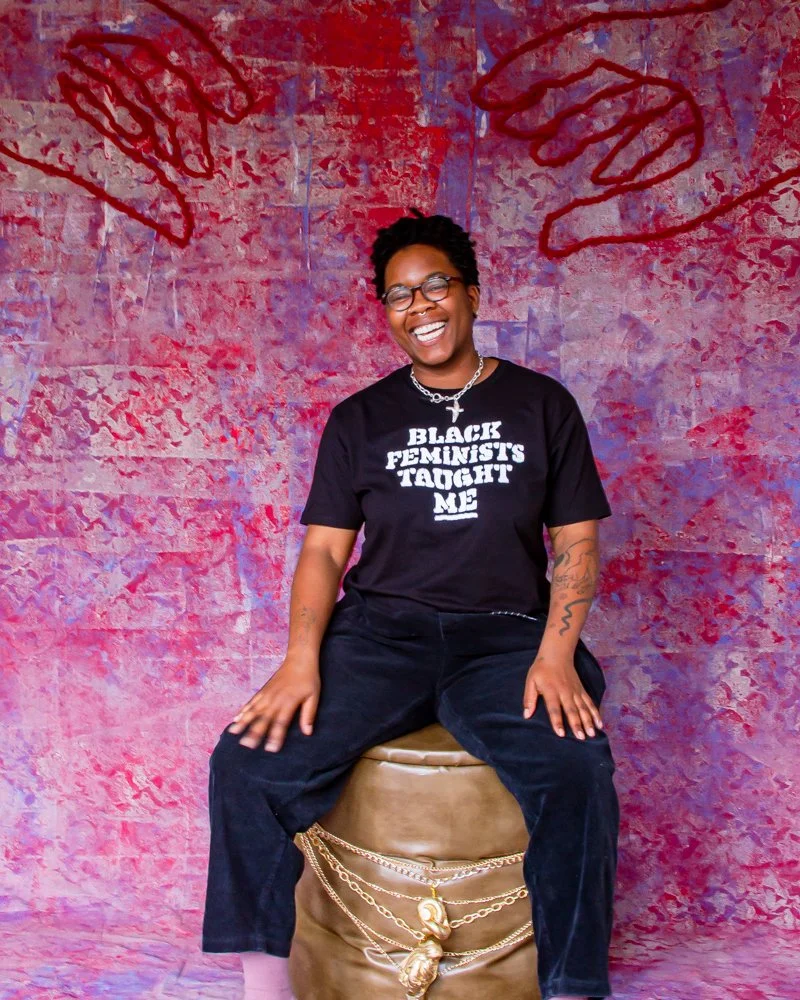New York City -
New York City -
Celebrating the 50th Anniversary of the National Black Feminist Organization
The third collection honors the 50th anniversary of the National Black Feminist Organization (NBFO), founded in New York City in 1973. Featuring former members of the NBFO - Deborah Singletary and Eugenia Wiltshire - the collection also spotlights an intergenerational cohort of organizers, curators, journalists, scholars, and activists based in New York City, including: olaronke akinmowo, Aisha Becker-Burrowes, Zainab Floyd, Kamra Abdul-Hakim, Najha Zigbi -Johnson, Akemi Kochiyama, and Houreidja Tall,
The cohort offers insights on the impact of the National Black Feminist Organization and the power of Black feminist politics.
Photographer: Oluwakemi Oritsejafor
Videographer: Kerrin Lyons
Set Design: OACHAVEZ and Medgine Sénécharles.
A special thank you to Dr. Kimberly Springer for her pioneering scholarship on the National Black Feminist Organization, with her book titled, Living for the Revolution: Black Feminist Organizations, 1968-1980, and for connecting us to Eugenia Wiltshire and Deborah Singletary.
About the National Black Feminist Organization (NBFO)
In May 1973, a group of Black feminists came together to establish the National Black Feminist Organization (NBFO). With members such as Margaret Sloan-Hunter, an early editor of Ms. Magazine and chairman and the only president of the NBFO; Doris Wright, Black feminist writer; lawyer, radical feminist, and founding member of the National Organization for Women (NOW), Florynce “Flo” Kennedy; Jane McDougal Galvin-Lewis, vice-chair of the NBFO and staff member of the Women’s Action Alliance; Eleanor Holmes-Norton, lawyer, politician, and author; scholar-activist, Michele Wallace; and organizers and educators Deborah Singletary, Eugenia Wilshire, Dorothy King, Beverly Davis, and more, the NBFO was formulated in response to racist and sexist exclusion Black women endured in the civil rights, Black nationalist, and (white) women’s movements (Springer, 2005, pgs. 50, 51, 52, 68).
The NBFO emerged from several meetings of Black women at the offices of the National Organization of Women in New York City. The inaugural meeting of the NBFO was initiated to “...discuss Black women and their relationship to the feminist movement” (Hull and Smith, 2003, p. 12). Discussing their commonalities, they came together to not only repudiate racialized and gendered stereotypes but to also center the reproductive justice for Black women, as they recognized the patriarchal and misogynistic response to the landmark Roe v. Wade decision by many Black nationalists (Springer, 2005, p. 51).
On August 15, 1973, the formation of the NBFO was officially announced at a press conference in New York City. In their statement of purpose, the NBFO sought to define feminism on their own terms, a Black feminism that “...address[es] ourselves to the particular and specific needs of the larger, but almost cast-aside half of the Black race in Amerikkka, the Black woman” (NBFO Statement, 1973). Moreover, they noted: “We will continue to remind the Black Liberation Movement that there can’t be liberation for half the race.”
After the official announcement of the organization, the NBFO garnered hundreds of responses from Black women across the United States (Springer, 2005, p. 51). From November 30-December 3rd, 1973, the NBFO hosted an Eastern Regional Conference at the Cathedral of St. John the Divine in New York City. With hundreds of Black women attending the conference from across the nation, including California, Illinois, Pennsylvania, Massachusetts, Texas, Mississippi, and Washington, according to Springer, the Eastern Regional Conference “...is a notable event in Black feminist organizing history because it was the first time a large number of Black women came to discuss feminism” (p. 93).
Notable speakers and attendees of the Eastern Regional Conference included June Jordan, Barbara Smith, Beverly Smith, Demita Frazier, Shirley Chisholm, Florynce “Flo” Kennedy, and Alice Walker. Later, the NBFO established chapters in Chicago, Atlanta, Washington, D.C, San Francisco, Cleveland, and Boston (Springer, p. 51, 60).
While the organization officially disbanded in 1975 due to lack of infrastructure and differences in political and ideological alignment, the NBFO opened up political doorways for other more radical Black feminists organizations to emerge, such as the Combahee River Collective, a Black feminist, lesbian, and socialist organization active in Boston, Massachusetts from 1974 to 1980, and the National Alliance of Black Feminists (NABF), a Chicago-based Black feminist organization, most notably led by Brenda Eichelberger, the executive director of NABF, Linda Johnston, Brenda Porter, and Janie Nelson.
Sources:
All the Women Are White, All the Blacks Are Men, But Some of Us Are Brave: Black Women's Studies (1982) by Akasha (Gloria T.) Hull, Patricia Bell Scott, and Barbara Smith
Living for the Revolution: Black Feminist Organizations, 1968-1980 (2005) by Kimberly Springer
NBFO Statement of Purpose
Collage by Doriana Diaz
Members of the National Black Feminist Organization Speak
Deborah Singletary and Eugenia Wiltshire - former members of the National Black Feminist Organization - offer insights on the impact of the organization 50 years later.
Watch the Videos
Black Feminists in NYC: On the Power of Black Feminism
An intergenerational cohort of New York City-based Black feminists examine the power of Black feminist politics and the National Black Feminist Organization.









